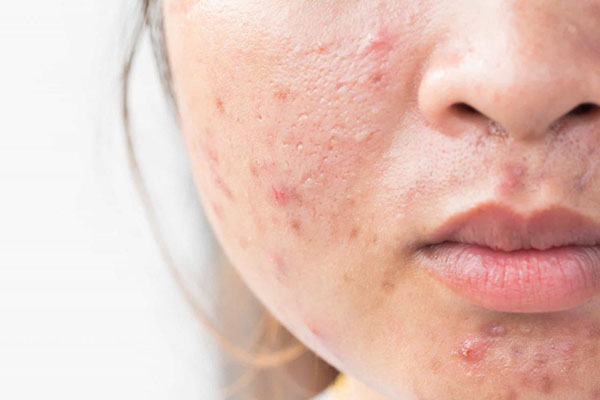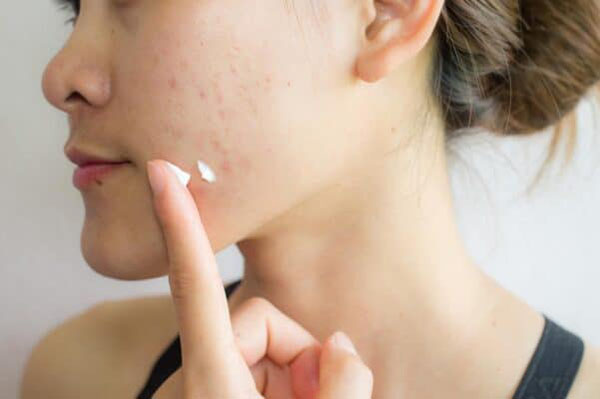Acne is common – very normal – and so are acne scars. There are treatments for acne, and there are treatments for acne scars. Some choose to just “live with” their acne scars while others find that the scars interrupt their daily lives too much. However, acne scars do not have to be permanent, as some home remedies and medical treatments can help get rid of them.
In this article, learn about a variety of ways to help fade or even remove acne scars and promote healthy skin.
What are acne scars?
Scarring is a common complication of acne, particularly in people who have moderate or severe acne. Scarring can occur when acne spots burst, or are picked or squeezed. The skin around the spot is damaged, and scars develop, which is a permanent change.
Any type of acne spot can leave a scar if it damages the skin. Some acne blemishes are small and the scars created are shallow and heal quickly. Sometimes the contents of blemishes spill into the surrounding tissue and cause deeper scars.

Why do acne scars occur?
There are many reasons, but genetics is one of the most common ones for scarring.
Scars happen because your body is trying to repair the acne. How your unique body responds to a wound determines if and how much scarring you’ll have. The process of repair includes the creation of collagen, a substance that gives the skin support. If the body produces too little or too much collagen, you will see a scar. The type of scar depends on how much collagen your body makes.
Even when we do our best to prevent acne scars, some people scar. There are many treatment options, which can significantly diminish depressed and raised acne scars.
How to prevent acne scars?
Various remedies are available over the counter, many of which can help people manage their acne and reduce the appearance of scars.
Caring your skin first
Establish a daily skincare regime that targets the main contributing factors of breakouts: excess oil, excess dead skin cells, bacterial growth, chronic inflammation and post-inflammatory hyperpigmentation (this is what causes those stubborn post-breakout marks). Acne is not caused by poor hygiene, but keeping your skin clean can help to reduce the blockages in the skin that cause acne spots.
Remember to avoid squeeze or pick at spots. Not only can burst spots damage the skin and cause scarring, squeezing and picking can also lead to infection.
In addition to this, if your skin reacts badly to a particular product, stop it instantly. Only stick to gentle skincare products that alleviate your skin instead of provoking it.
Exfoliate regularly
Consider your skin type and needs, and if you have oily skin, you can exfoliate daily in some cases. But for sensitive, dry, normal, or combination skin, you should stick to exfoliating once or twice a week.
When done regularly and with the right products compatible with your skin, exfoliating can fade acne scars and make them smoother and less noticeable. Particularly, exfoliating can help remove the topmost layer of dead skin cells that accumulate and dull your skin’s appearance and block its pores. This process can leave your skin looking brighter and can reduce your chances of having clogged pores and breakouts. It can also make your skin look younger since it stimulates the production of collagen.
Besides your body’s own natural ability to turn over and shed old and dead skin cells, there’s two types of exfoliation methods that you can use to assist and speed up this process: physical exfoliation or chemical exfoliation (or a mixture of both).
Try simple home remedies
If you can’t afford to buy a fancy cream or facial, there are a few simple home remedies that might help fade scars. These natural products are known for their healing properties and can work wonders in helping reduce the appearance of marks and calming skin.
Honey: You don’t even have to go to the drugstore for this potential acne scar remedy. Honey is used for numerous medicinal purposes, including burns, wounds, and herpes because of its antibacterial properties. It is also able to fight infections that could otherwise cause more acne to appear. Use a q-tip and dab raw honey directly on your scarred areas.
Aloe Vera: Like honey, aloe vera is a common home remedy. In the case of acne, it works similarly to aid the healing process. You can find aloe vera gels and products at drugstores, or you can also grow the plant yourself. Cut into the leaves and apply the sticky gel directly to the skin.
Rosehip Seed Oil: Marketed largely as a solution for aging, rosehip seed oil is widely available and is safe to apply directly to the skin. Applying it twice daily can reduce the appearance of scars and discoloration.

Apply vitamin C
Vitamin C is proven to fade dark spots, as well as provide protection against environmental aggressors so that further dark spots are prevented, and should be a firm fixture in your skincare regime.
Your skin can take a while to heal after an acne breakout. If it doesn’t heal properly, it may develop acne scars. When you apply vitamin C serum to the affected area, it works by promoting the synthesis of collagen. This is the protein that builds your skin structure and promotes healthy skin. With increased collagen production, the healing of acne wounds is faster.
Although you get vitamin C from the foods you eat, it probably doesn’t end up in your skin. Using vitamin C serum is the easiest and most direct way to deliver the nutrient to your skin. It’s a highly effective product in the treatment of acne. This explains why most skincare products contain vitamin C.
Take retinol skin products
Also known as vitamin A, retinol goes hand in hand with anti-ageing treatments but can also be used to unclog pores and fade scars. It’s a more gradual treatment but is popular for leaving skin looking brighter and smoother.
It is important to note that retinoids can make the skin sensitive to the sun. Anyone using retinoids for acne or scar treatment should wear sunscreen when going outdoors. Hence, the best way is to apply it at night to protect your skin. Also, avoid it if you have rosacea – it can upset and irritate.
Get laser treatment
Laser treatment resurfaces the skin without the use of chemicals or scrubs. It removes the uppermost layer of skin to reveal the younger skin cells underneath, which can help reduce the appearance of scarring.
Laser treatment can be an effective way of repairing damaged skin. The treatment is not suitable for everyone, however, as its success is mostly dependent on the acne scarring that a person has and their skin type. The treatment may also cause a reaction in some people, especially those with sensitive skin.
Microneedling
Microneedling is the process of inserting tiny needles into the skin surrounding the scar to stimulate the body to make more collagen. This collagen may reduce the appearance of acne scars by smoothing out the skin.
Microneedling can be done alone or with heat (i.e. microneedling radiofrequency). Microneedling radiofrequency has shown to help with textural improvement from acne scarring and can prevent further acne from forming.
However, microneedling can cause side effects. Many people experience redness, pain, and inflammation after the treatment, but these effects subside over time.
Dermabrasion
This is a cosmetic procedure where the top layer of the skin is removed, typically with a special instrument that is rolled across the skin.
Removing the top layer of the skin can reduce the appearance of acne scarring and make the skin smoother, however this technique is not as effective with deep scars.
You may need two or three dermabrasion procedures for an effect to be seen. After each procedure your skin may be red, sore and swollen for several months while it heals.
Follow a healthy diet
Acnes and pimples are an obvious sign that the body is not in good balance and is eliminating toxic and excess oil, produced in the sebaceous glands.
The biggest takeaway on diet and acne is that a low-sugar, well-balanced diet is ideal for reducing inflammation and regulating hormone (and thus, sebum) levels. Besides, you should avoid consuming fatty, greasy, and starchy foods because they make your scarring worse. If you need a supplement that can pack good vitamins and nutrients to support your skin from within, you can consult our products, particularly NuBest White.
After all, your body is 60 percent water, so it’s no surprise you need to drink enough water to optimize physical processes. Drinking water is also key to consuming the correct amount of daily calories – often we mistake hunger for thirst, so when in doubt drink water first. Drinking plenty of water helps flush out toxins from the body and makes the skin look firmer.Acne scars can be an unwanted reminder of acne and may reduce self-esteem in some people, but they do not have to be permanent.
Many people have success using one or more home remedies. In cases of stubborn scarring, receiving medical treatments in the dermatologist’s office can also help get rid of acne scars.
- Related post: How to stop acne on face



